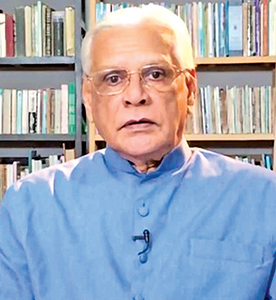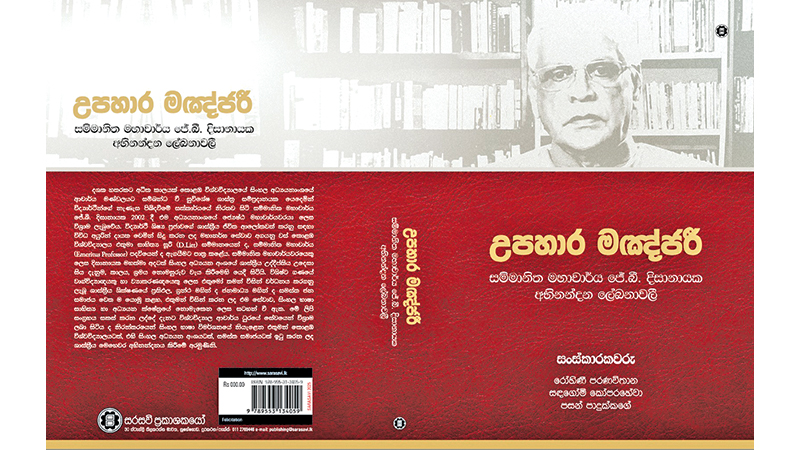The Department of Sinhala at the University of Colombo hosted a felicitation ceremony at the New Arts Theatre of the University of Colombo on Friday, honouring one of Sri Lanka’s most revered scholars, prolific writers and public intellectuals — Emeritus Prof. J. B. Dissanayake, with Prime Minister Dr. Harini Amarasuriya in attendance.
A felicitation volume titled Upahara Manjari, edited by Emeritus Prof. Rohini Paranavitana, Senior Prof. Sandagomi Coperahewa and Pasana Padukkage, was also launched during the ceremony. The publication celebrates Prof. Dissanayake’s remarkable contributions to Sri Lankan academia, language and cultural life.
Scholarship and service

Prof. J. B. Dissanayake
Born on April 16, 1937, in Rambukkana in the Kegalle District, Prof. Dissanayake began his education at Dharmaraja College, Kandy, and completed his secondary schooling at Ananda College, Colombo.
In 1958, he entered the University of Ceylon, Peradeniya, where he studied under renowned scholars such as D. E. Hettiarachchi, M. B. Ariyapala, Ediriweera Sarachchandra, and most notably, M. W. Sugatapala De Silva — the pioneering academic who introduced modern linguistics to Sri Lankan universities.
Graduating with First Class Honours in Sinhala in 1961, Dissanayake was awarded a Fulbright Scholarship and proceeded to the University of California, Berkeley, where he earned an M.A. in linguistics. Returning to Sri Lanka in 1963, he joined the academic staff of the University of Colombo. In 1980, he earned his Ph.D. from the same university for his dissertation The Word in Modern Literary Sinhala.
Pioneering linguistics
Prof. Dissanayake played a trailblazing role in establishing the country’s first Department of Linguistics at the University of Colombo under the deanship of Prof. Ariyapala. From the outset, the department was designed to accommodate instruction in Sinhala, Tamil, and English, breaking new ground in multilingual higher education.
Though the department was later moved to the University of Kelaniya following educational reforms in 1972, Prof. Dissanayake remained at the University of Colombo, rejoining the Department of Sinhala.
He continued to enrich academic life there, eventually founding the Journalism Unit in 1986, where he served as the first coordinator.
Scholar, writer and communicator
As a linguist, Prof. Dissanayake is widely recognised as the first descriptive grammarian of the Sinhala language.
He applied principles of modern linguistics to analyse contemporary Sinhala usage, which he termed Samakālīna Sinhala. His seminal works Bhashāwaka Rata Samudaya (1969) and Bhashāwaka Bhāvitaya saha Vigrahaya (1970) laid the foundation for decades of scholarly inquiry into modern Sinhala.
Over his career, Prof. Dissanayake has authored more than 200 books in Sinhala and English and published over 100 scholarly articles.
His writing spans language, culture, literature, folklore, and traditional arts and crafts. His newspaper columns and media appearances have made him a beloved and accessible public intellectual, capable of communicating complex ideas with clarity, wit and warmth.
Cultural studies and folk linguistics
Among Prof. Dissanayake’s many scholarly interests, folk linguistics and Sinhalese folklore hold a special place.
His 1976 publication Sinhala Janavāhara marked the beginning of a series of influential works, including The Monk and the Peasant (1993), Aspects of Sinhalese Folklore, Water in Culture: The Sri Lankan Heritage of the Sinhalese (1992), Mihintale: Cradle of Buddhist Civilization (1987), and Understanding Sinhalese (1998).
His academic voice has also shaped national education and language policy.
He has consistently advocated for mother-tongue education, culturally embedded literacy, and joyful approaches to language learning. His influence continues to guide educators and linguists across generations.
A moderniser of Sinhala
Prof. Dissanayake was a member of the expert committee appointed by the National Education Commission in 1989 to standardise Sinhala writing. The outcome of this effort was the Samakālīna Sinhala Lekhana Rītiya (Contemporary Sinhala Writing Style), which sought to modernise written Sinhala for clarity, consistency and educational use.
He was instrumental in proposing the addition of two characters—Gña and Fa—to the Sinhala alphabet. Although the committee did not adopt Gña, Prof. Dissanayake persisted. With the assistance of the late Prof. V. K. Samaranayake of the Faculty of Science, he helped integrate the character into the Sinhala Unicode standard.
Working alongside Prof. Samaranayake and Dr. S. T. Nandasara, he played a vital role in adapting Sinhala to the digital age. This collaboration laid the foundation for “Computer Sinhala” and ensured that the language remained vibrant and functional in the information technology landscape of the 21st century.
A Cultural Ambassador
In addition to his academic and literary accomplishments, Prof. Dissanayake served as Sri Lanka’s Ambassador to Thailand after retiring from university service.
However, he had long played the role of an unofficial Cultural Ambassador through his international engagements.
He served as Chair at the School of Oriental and African Studies (SOAS), University of London, in 1992–93, and later as a visiting Prof. at Wako University in Japan. He also contributed significantly to the study of the Divehi language of the Maldives, collaborating with Prof. Hemapala Wijewardhane to investigate its historical evolution and contemporary usage.
Honouring a national legacy
Prof. J. B. Dissanayake’s contributions have left an indelible mark on Sri Lankan intellectual, cultural and academic life. His work transcends disciplinary boundaries and reaches beyond the academy into the homes, hearts and minds of generations of Sri Lankans.
The felicitation was not merely an event of ceremonial respect—it was a celebration of a life devoted to the pursuit of knowledge, the promotion of language and culture, and the transformation of education. Prof. Dissanayake is not just a scholar or a writer; he is a national treasure whose legacy will continue to inspire long into the future.
The writer is a Senior Lecturer, Department of Sinhala, University of Colombo







